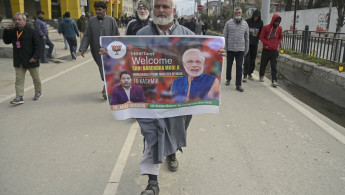India's Modi to visit Kashmir, first time since special status cut
Prime Minister Narendra Modi is to hold a rally in main city of Indian-administrated Kashmir on Thursday, on his first visit since the disputed region's semi-autonomy was cancelled in 2019.
Modi's government stripped the Muslim-majority territory of its special constitutional status, splitting the former state into two territories directly ruled from New Delhi.
The move, widely welcomed across India, angered many in the densely militarised territory.
Rebels in the Himalayan region have waged an insurgency since 1989, seeking independence or a merger with Pakistan -- which controls a smaller part the Kashmir region and, like India, claims it in full.
Thousands of armed police and paramilitary forces were deployed, and new checkpoints set up across Kashmir's main city Srinagar, where the Hindu nationalist leader is scheduled to address a public gathering around midday.
"Various development works will also be dedicated to the nation," Modi said in a statement on social media platform X ahead of the visit, including programmes "boosting the agro-economy" as well as tourism.
A government statement said Modi will also inaugurate infrastructure around the revered Muslim shrine of Hazratbal.
The visit comes ahead of India's national elections due by May, the first since the region lost its autonomy. The last local elections in Kashmir were held in 2014.
Modi's government claims New Delhi's direct rule of Kashmir brought about a new era of "peace and development" in the region, but critics and many residents say it heralded a drastic curtailment of civil liberties and press freedom.
Security forces on Thursday patrolled the streets, as well as in motorboats along the river that runs through Srinagar.
Most schools in the city are shut for the day, and the authorities have called on government employees to attend the rally.
Omar Abdulla, a former chief minister of Jammu and Kashmir, accused the government of organising buses to bring in crowds to attend the rally, alleging that "almost none" would be attending willingly.





 Follow the Middle East's top stories in English at The New Arab on Google News
Follow the Middle East's top stories in English at The New Arab on Google News


